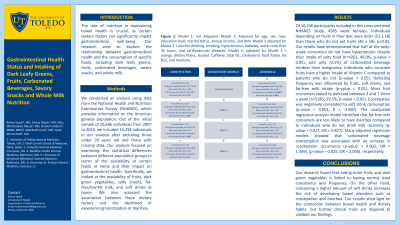Monday Poster Session
Category: Obesity
P3166 - Gastrointestinal Health Status and Intaking of Dark Leafy Greens, Fruits, Carbonated Beverages, Savory Snacks and Whole Milk Nutrition
Monday, October 28, 2024
10:30 AM - 4:00 PM ET
Location: Exhibit Hall E

Has Audio
.jpg)
Bisher Sawaf, MD
University of Toledo
Toledo, OH
Presenting Author(s)
Mhd Kutaiba Albuni, MD1, Bisher Sawaf, MD2, Amine Rakab, MD, MSc3, Shahem Abbarah, MD4, Abdellatif Ismail, MD5, Tarek Aboursheid, MD6
1TriHealth, Doha, Ad Dawhah, Qatar; 2University of Toledo, Toledo, OH; 3Weill Cornell Medicine, Doha, Ad Dawhah, Qatar; 4MedStar Health, Baltimore, MD; 5University of Maryland Medical Center, Baltimore, MD; 6Ascension Saint Francis Hospital, Evanston, IL
Introduction: The role of nutrition in maintaining bowel health is crucial, as certain dietary factors can significantly impact gastrointestinal well-being. Our research aims to explore the relationship between gastrointestinal health and the consumption of specific foods, including dark leafy greens, fruits, carbonated beverages, savory snacks, and whole milk.
Methods: We conducted an analysis using NHANES data to examine the availability of certain foods at home and their impact on gastrointestinal health. We included 10,258 individuals from the initial sample of 20,686 after excluding those under 20 years old and those with missing data. Our focus was on the statistical differences between different population groups, as well as the association between dietary factors and the likelihood of experiencing constipation or diarrhea.
Results: In a cross-sectional NHANES study of 10,246 participants, findings showed that individuals who consume fruits are older, have higher Vitamin C intake, and half of salty snack consumers do not have hypertension despite their intake of salty food. Additionally, only 3.5% of carbonated beverage drinkers have malignancy. Defecting frequency was influenced by fruits, soft drinks, and fat-free milk intake (P-value < 0.05). Most fruit consumers stated that they defecate between 3 and 7 times a week (n=5285, 59.5%, P-value < 0.05). Constipation was negatively correlated to soft drink consumption (P-value < 0.001, R = -2.607). The unadjusted regression analysis model found that fat-free milk consumers are less likely to have diarrhea (P-value = 0.017, OR = 0.827). Additionally, adjusted regression models showed that carbonated beverage consumption was associated with an increased occurrence of constipation (p-value = 0.003, OR = 1.349, and p-value = 0.025, OR = 2.056).
Discussion: Our research found that eating more fruits and dark green vegetables is linked to having normal stool consistency and frequency. On the other hand, consuming a higher amount of soft drinks increases the risk of developing bowel disorders such as constipation and diarrhea. Our results shed light on the connection between bowel health and dietary habits, but further clinical trials are required to validate our findings.
Disclosures:
Mhd Kutaiba Albuni, MD1, Bisher Sawaf, MD2, Amine Rakab, MD, MSc3, Shahem Abbarah, MD4, Abdellatif Ismail, MD5, Tarek Aboursheid, MD6. P3166 - Gastrointestinal Health Status and Intaking of Dark Leafy Greens, Fruits, Carbonated Beverages, Savory Snacks and Whole Milk Nutrition, ACG 2024 Annual Scientific Meeting Abstracts. Philadelphia, PA: American College of Gastroenterology.
1TriHealth, Doha, Ad Dawhah, Qatar; 2University of Toledo, Toledo, OH; 3Weill Cornell Medicine, Doha, Ad Dawhah, Qatar; 4MedStar Health, Baltimore, MD; 5University of Maryland Medical Center, Baltimore, MD; 6Ascension Saint Francis Hospital, Evanston, IL
Introduction: The role of nutrition in maintaining bowel health is crucial, as certain dietary factors can significantly impact gastrointestinal well-being. Our research aims to explore the relationship between gastrointestinal health and the consumption of specific foods, including dark leafy greens, fruits, carbonated beverages, savory snacks, and whole milk.
Methods: We conducted an analysis using NHANES data to examine the availability of certain foods at home and their impact on gastrointestinal health. We included 10,258 individuals from the initial sample of 20,686 after excluding those under 20 years old and those with missing data. Our focus was on the statistical differences between different population groups, as well as the association between dietary factors and the likelihood of experiencing constipation or diarrhea.
Results: In a cross-sectional NHANES study of 10,246 participants, findings showed that individuals who consume fruits are older, have higher Vitamin C intake, and half of salty snack consumers do not have hypertension despite their intake of salty food. Additionally, only 3.5% of carbonated beverage drinkers have malignancy. Defecting frequency was influenced by fruits, soft drinks, and fat-free milk intake (P-value < 0.05). Most fruit consumers stated that they defecate between 3 and 7 times a week (n=5285, 59.5%, P-value < 0.05). Constipation was negatively correlated to soft drink consumption (P-value < 0.001, R = -2.607). The unadjusted regression analysis model found that fat-free milk consumers are less likely to have diarrhea (P-value = 0.017, OR = 0.827). Additionally, adjusted regression models showed that carbonated beverage consumption was associated with an increased occurrence of constipation (p-value = 0.003, OR = 1.349, and p-value = 0.025, OR = 2.056).
Discussion: Our research found that eating more fruits and dark green vegetables is linked to having normal stool consistency and frequency. On the other hand, consuming a higher amount of soft drinks increases the risk of developing bowel disorders such as constipation and diarrhea. Our results shed light on the connection between bowel health and dietary habits, but further clinical trials are required to validate our findings.
Disclosures:
Mhd Kutaiba Albuni indicated no relevant financial relationships.
Bisher Sawaf indicated no relevant financial relationships.
Amine Rakab indicated no relevant financial relationships.
Shahem Abbarah indicated no relevant financial relationships.
Abdellatif Ismail indicated no relevant financial relationships.
Tarek Aboursheid indicated no relevant financial relationships.
Mhd Kutaiba Albuni, MD1, Bisher Sawaf, MD2, Amine Rakab, MD, MSc3, Shahem Abbarah, MD4, Abdellatif Ismail, MD5, Tarek Aboursheid, MD6. P3166 - Gastrointestinal Health Status and Intaking of Dark Leafy Greens, Fruits, Carbonated Beverages, Savory Snacks and Whole Milk Nutrition, ACG 2024 Annual Scientific Meeting Abstracts. Philadelphia, PA: American College of Gastroenterology.
